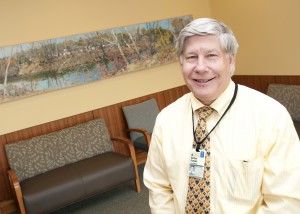Each Monday this month, we’re looking at the UVA Cancer Center’s Integrative Medicine Program.

For many patients, cancer is becoming a chronic disease. Because of the advanced treatments available, more and more people are living with cancer. But it scares people considerably more than other chronic diseases like heart disease or arthritis.
Infusion can become an almost normal part of life for some cancer patients, part of their routine. But it’s far from normal in reality, and the anxiety and anxiousness build up over time, as do the fatigue and exhaustion that come with cancer treatment and the stresses it puts on work, family life and finances.
This stress tests patients. It can even test their faith. Sometimes, in these cases, it helps to have someone who is there to listen. An objective observer who can let you talk through your problems and anxieties.
That’s where Rev. Gordon Putnam comes in. He’s the chaplain at the UVA Cancer Center. And the way he sees it, one of his roles as a chaplain is simply to be present.
Putnam spends a large part of his time wandering the infusion center, where patients wait to receive their chemotherapy. He talks to patients and lets them know he’s a resource for them.
Often, says Putnam, patients receiving infusion therapy aren’t in crisis. They’re just going through part of their “normal” routine. But by letting them know he’s there, they know they can turn to him if they need to.
He follows the lead of each patient. Some are interested. Others are not.
Initially, Suzanne Smith wasn’t sure she was interested in talking to Rev. Putnam. But after she saw him with other patients, she changed her mind. “I’m open,” she thought.
Smith is Catholic, but says she appreciates that UVA’s chaplaincy services are for everyone, whether they have a faith tradition or not.
“I’ve honestly benefited from chaplaincy services as much as from nurses and doctors quite a few times,” she says, noting that people have believed in the healing properties of faith for thousands of years.
Smith says she was “rock bottom last summer — physically, mentally and, in a way, spiritually. He asked, ‘Do you mind if I pray with you?'” When they prayed, she says, “it was like a ton of baggage released, the fears and everything you have going on is being relieved and turned over.”
Spiritual Questions
The way Putnam, who was a Lutheran parish pastor for six years, sees it, a faith leader like a pastor or rabbi works within their faith community to help people understand the beliefs of that community. A chaplain like Putnam helps all kinds of people of different faiths to understand their own existing faith.
Putnam says everyone has spirituality at some level: “Why did this happen to me?” “What is existence?” Religion is how people organize those thoughts, he says.
And while cancer is becoming more of a chronic disease, death, or at least the possibility of death, is something that some patients do have to face.
Patients often initially say they don’t want to talk about death, but a lot of times that’s not the case, Putnam says. “You have to listen to them and they will let you know. There are lots of ways to deal with any situation, whether it’s cancer, whether you talk about it or don’t talk about it.”
Identifying Spiritual Distress
Identifying patients with spiritual distress is key for Putnam.
Many patients are familiar with the pain thermometer, where you rank your pain on a scale of 1-10, with 10 being the worst pain.
Putnam now uses a similar tool called a distress thermometer, which measures emotional problems, spiritual concerns, family and household issues and physical problems. Patients fill out a simple form that rates their spiritual distress on the 1-10 scale and also allows them to list various stressors. The form is used in many oncology clinics throughout the country and helps Putnam and other cancer center staff like our social worker and patient navigator to identify those in need.
Good Communication
Putnam is there for patients in other ways, too. Many times, doctors will use big words or medical terms that are confusing to patients. He tries to help facilitate communication between the doctors and the patients and encourages patients to ask doctors to explain those confusing terms. Often, when patients get an explanation, they understand and that helps alleviate stress and confusion, he says.
Smith thinks plenty of others could benefit from UVA’s Cancer Center chaplain or the chaplaincy services in the hospital. “It’s a nice tool to have in the toolkit of treatment and care,” she says.
Share Your Story
Have you or a loved one benefited from speaking with a chaplain? Share your story with us by commenting on this post.